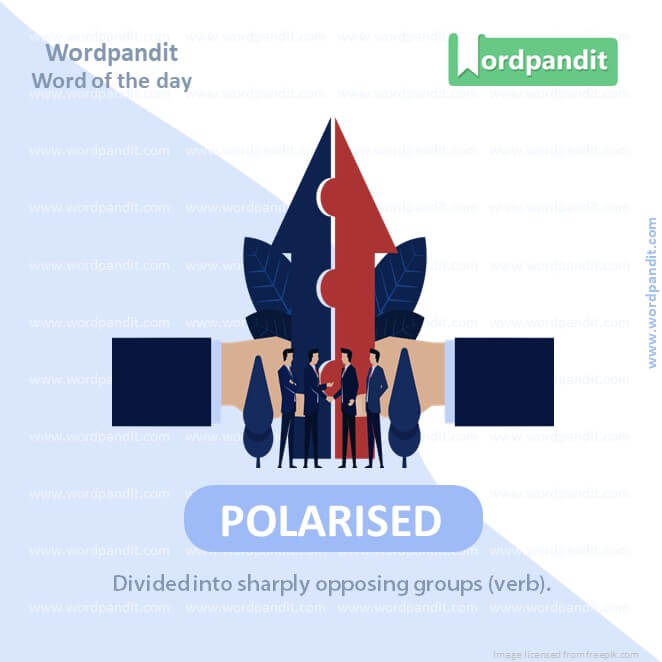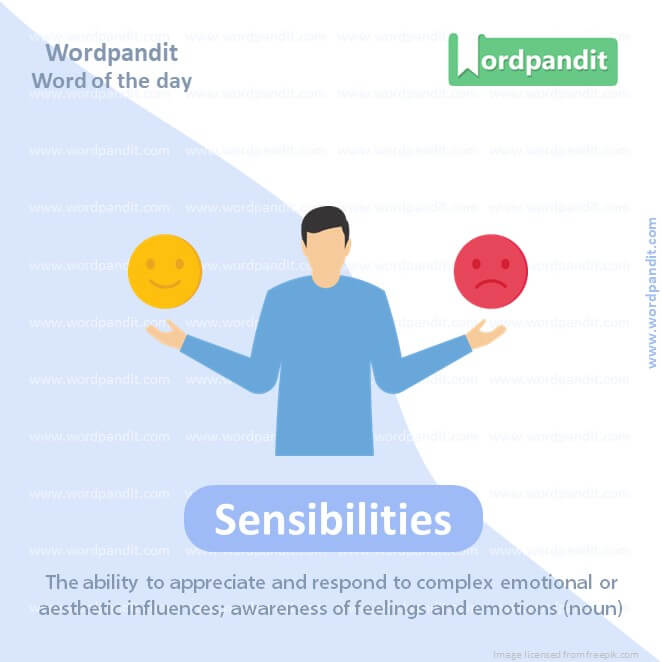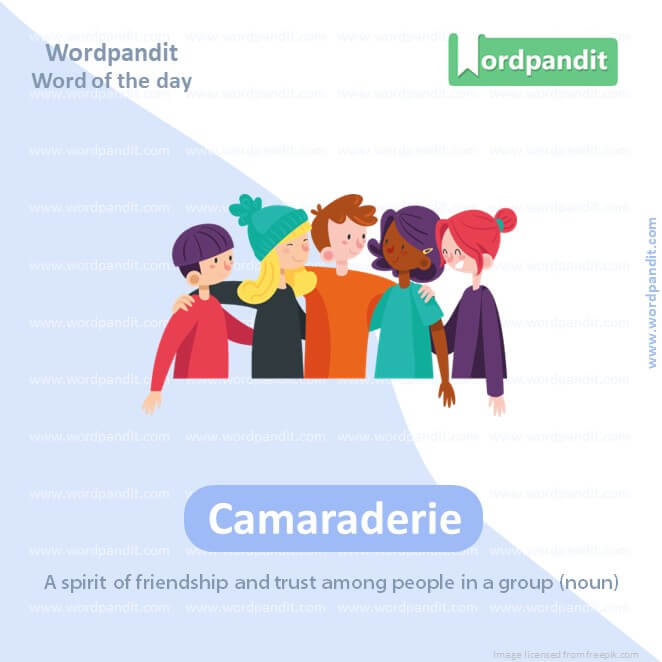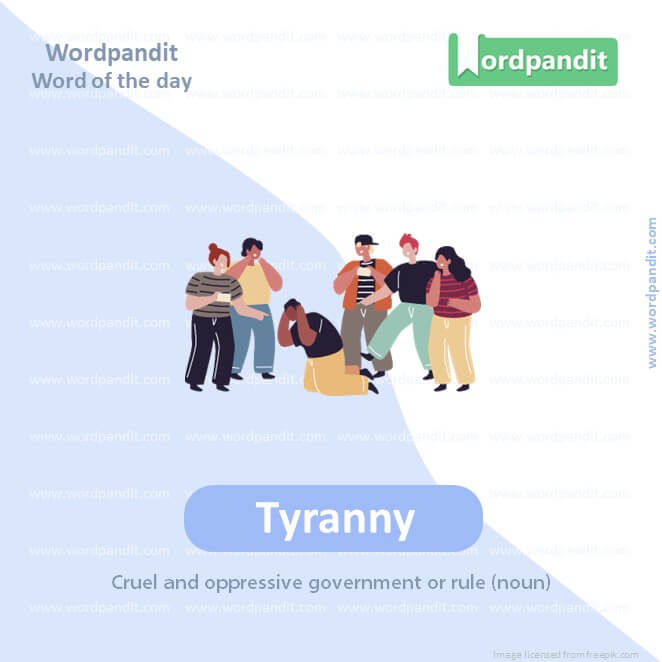Daily Vocabulary Words: List of Daily Used Words in Leading Indian Newspapers
Hi there. Welcome to this special section @ Wordpandit. Our endeavour here is straightforward: highlighting daily vocabulary words that you would come across in leading newspapers in the country. We have included the following newspapers in our selection:
• The Times of India
• The Economic Times
• Hindustan Times
• Mint
• Indian Express
We are putting in extensive work to develop your vocabulary. All you have to do is be regular with this section and check out this post daily. This is your repository of commonly used words; essentially, we are posting a list of daily used words. Hence, this has significant practical application as it teaches you words that are commonly used in leading publications mentioned above.
Visit the website daily to learn words from leading Indian newspapers.

WORD-1: Polarised
CONTEXT: As the world becomes more polarised, Shakti and its win are reminders of how distant traditions can live with each other — even appreciate one another — by allowing the other to exist and being a bulwark against powers that seek to keep them apart
SOURCE: Indian Express
EXPLANATORY PARAGRAPH: Imagine your class can’t decide between chocolate and vanilla ice cream for a party. Half the class really wants chocolate, and the other half really wants vanilla, and nobody wants to change their mind. This situation is like being “polarised.” It means people are split into two very different groups with opposite opinions or feelings about something.
MEANING: Divided into sharply opposing groups (verb).
PRONUNCIATION: PO-luh-ryzd
SYNONYMS: divided, split, dichotomized, opposed, segmented
USAGE EXAMPLES:
1. The community was polarised on the issue of building the new park.
2. His statement polarised the audience, leaving little room for middle ground.
3. The debate has become increasingly polarised.
4. Social media often polarises public opinion.

WORD-2: Artistic
CONTEXT: They lived on opposite sides of the US and had begun their musical lives amid disparate worlds of thought and artistic sensibilities.
SOURCE: Indian Express
EXPLANATORY PARAGRAPH: Imagine you love to draw, paint, and create things that show your ideas and feelings. That’s being “artistic.” It means you have a special talent for making art, like painting beautiful pictures, playing music, or dancing in a way that expresses creativity and imagination.
MEANING: Related to or showing skill and creativity in the arts (adjective).
PRONUNCIATION: ar-TIS-tik
SYNONYMS: creative, aesthetic, imaginative, inventive, expressive
USAGE EXAMPLES:
1. She has an artistic talent for painting landscapes.
2. The festival celebrated artistic achievements in the community.
3. He is known for his artistic approach to photography.
4. The project required a high level of artistic skill.

WORD-3: Sensibilities
CONTEXT: They lived on opposite sides of the US and had begun their musical lives amid disparate worlds of thought and artistic sensibilities.
SOURCE: Indian Express
EXPLANATORY PARAGRAPH: Imagine you can feel when your friend is sad without them saying anything, and you try to make them feel better. That’s because you have “sensibilities.” It means you can understand and feel things deeply, like emotions or beauty, and you’re aware of how different things, like music or stories, can make people feel.
MEANING: The ability to appreciate and respond to complex emotional or aesthetic influences; awareness of feelings and emotions (noun).
PRONUNCIATION: sen-suh-BIL-i-tees
SYNONYMS: sensitivities, perceptions, tastes, awareness, discernments
USAGE EXAMPLES:
1. The movie appeals to the sensibilities of a modern audience.
2. His music speaks to the sensibilities of a younger generation.
3. She was known for her refined artistic sensibilities.
4. The book challenges the moral sensibilities of its readers.
WORD-4: Violinist
CONTEXT: Around the same time, Shankar and America-born British violinist Yehudi Menuhin collaborated with gratifying results, winning a Grammy for Chamber Music Performance for their 1967 recording West Meets East.
SOURCE: Indian Express
EXPLANATORY PARAGRAPH: Imagine someone who can play the violin really well, making beautiful music with it. This person is called a “violinist.” They practice a lot to be good at moving the bow across the strings to create lovely tunes that can make you feel happy, sad, or excited.
MEANING: A person who plays the violin (noun).
PRONUNCIATION: vye-uh-LIN-ist
SYNONYMS: fiddler, musician, performer, instrumentalist, string player
USAGE EXAMPLES:
1. The orchestra featured a solo by a renowned violinist.
2. She aspires to become a professional violinist.
3. The violinist practiced for hours every day.
4. A young violinist won the music competition.
WORD-5: Amalgamation
CONTEXT: But what Shakti was experimenting with was an amalgamation of not only music from East and West but also the classical forms from north and south India, something rarely attempted in those days.
SOURCE: Indian Express
EXPLANATORY PARAGRAPH: Imagine you have different colors of playdough, and you mix them together to make a new, unique color. That mixing together is like “amalgamation.” It’s when you combine different things, like ideas, styles, or companies, into one big thing that has a bit of everything in it.
MEANING: The action, process, or result of combining or uniting (noun).
PRONUNCIATION: a-mal-guh-MAY-shun
SYNONYMS: merger, blend, fusion, combination, integration
USAGE EXAMPLES:
1. The amalgamation of the two companies created a new industry leader.
2. His style is an amalgamation of traditional and modern influences.
3. The recipe is an interesting amalgamation of flavors from different cuisines.
4. The new educational program is an amalgamation of various teaching methods.
WORD-6: Mandolin
CONTEXT: In 1997, the Arts Council in Britain contacted Hussain to get the band back together, with the revised line-up including, for a while, mandolin giant U Srinivas and flute legend Pt Hariprasad Chaurasia.
SOURCE: Indian Express
EXPLANATORY PARAGRAPH: Imagine a small musical instrument that looks a bit like a guitar but has a rounder body and a shorter neck. You play it by plucking its strings with a pick. This instrument is called a “mandolin.” It makes a lovely, twinkling sound that can be used in many types of music, from classical to folk.
MEANING: A small, stringed musical instrument with a pear-shaped body, a short neck, and usually eight strings, played by plucking (noun).
PRONUNCIATION: man-duh-LIN
SYNONYMS: instrument, stringed instrument, lute, musical device
USAGE EXAMPLES:
1. She learned to play the mandolin from her grandfather.
2. The band featured a mandolin in their latest song.
3. He collects vintage mandolins from around the world.
4. The mandolin solo added a unique sound to the concert.
WORD-7: Robustness
CONTEXT: Vocalist Shankar Mahadevan, ghatam and kanjira player V Selvaraj, and violinist Ganesh Rajagopalan joined later but brought in a robustness to the idea of common ground through varied styles.
SOURCE: Indian Express
EXPLANATORY PARAGRAPH: Imagine building a fort out of blocks that’s so strong, it doesn’t fall down when you accidentally bump into it. That strength and sturdiness of the fort is like “robustness.” It means something is strong, healthy, or able to withstand tough conditions without breaking or failing.
MEANING: The quality of being strong, healthy, or capable of withstanding tough conditions (noun).
PRONUNCIATION: roh-BUST-ness
SYNONYMS: strength, durability, resilience, sturdiness, toughness
USAGE EXAMPLES:
1. The robustness of the old bridge surprised everyone.
2. They tested the software for robustness against errors.
3. The robustness of the economy is evident in its growth.
4. Plant species are bred for robustness and yield.

WORD-8: Camaraderie
CONTEXT: What helped turn staunch critics around were the songs themselves — rich sonic hybrids that were an education in spiritual and musical camaraderie and consonance.
SOURCE: Indian Express
EXPLANATORY PARAGRAPH: Imagine you and your friends are part of a team, working together on a big project or playing a game. Everyone is helping each other, laughing, and having a good time. That feeling of friendship and being part of a team is called “camaraderie.” It’s when people come together and share a strong sense of trust and friendship.
MEANING: A spirit of friendship and trust among people in a group (noun).
PRONUNCIATION: kah-muh-RAH-duh-ree
SYNONYMS: fellowship, comradeship, brotherhood, solidarity, unity
USAGE EXAMPLES:
1. The sports team shared a sense of camaraderie on and off the field.
2. Camaraderie among the employees made the workplace enjoyable.
3. The trip fostered a strong camaraderie among the students.
4. They formed a bond of camaraderie during their time in the army.
WORD-9: Consonance
CONTEXT: What helped turn staunch critics around were the songs themselves — rich sonic hybrids that were an education in spiritual and musical camaraderie and consonance.
SOURCE: Indian Express
EXPLANATORY PARAGRAPH: Imagine you and your friends are singing different notes together, but it sounds really nice and harmonious. That blend of sounds that go well together is called “consonance.” It’s when things are in agreement or harmony, whether it’s sounds in music or ideas that fit well together.
MEANING: A harmonious agreement or compatibility between opinions or actions, or a combination of sounds that are harmonious when heard together (noun).
PRONUNCIATION: KON-suh-nans
SYNONYMS: harmony, accord, agreement, concord, compatibility
USAGE EXAMPLES:
1. The consonance between the violin and piano created beautiful music.
2. They worked in consonance to achieve their common goals.
3. The design showed a consonance of color and form.
4. Consonance in the team’s approach led to their success.

WORD-10: Tyranny
CONTEXT: Granting such a blanket immunity would have the consequence of placing the President of the United States above all law, the quintessential definition of tyranny.
SOURCE: Indian Express
EXPLANATORY PARAGRAPH: Imagine a ruler who makes all the rules without asking anyone else and punishes people harshly for any small mistake. This unfair and strict control is called “tyranny.” It’s when someone has too much power and uses it in a mean or harmful way, making life very hard for others.
MEANING: Cruel and oppressive government or rule (noun).
PRONUNCIATION: TIR-uh-nee
SYNONYMS: dictatorship, oppression, despotism, autocracy, authoritarianism
USAGE EXAMPLES:
1. The people lived under the tyranny of a cruel dictator.
2. They fought against the tyranny imposed by the occupying forces.
3. The novel explores themes of freedom and escape from tyranny.
4. His rule was marked by the tyranny and suppression of dissent.
vocabulary journal
Are you seeking ways to elevate your language skills? Consider diving into a vocabulary journal. This method has proven instrumental in learning and grasping new words. The benefits of maintaining a vocabulary journal are far-reaching, aiding students, writers, and language enthusiasts alike.
A vocabulary journal is a personal tool that pushes you to explore the depths of language beyond surface understanding. It doesn’t demand any complex skills; all you need is consistency, interest, and a willingness to learn. This simple, yet efficient, method aids you in enriching your language abilities by creating a personalized resource of words that you encounter and learn every day.
How exactly do you learn from a vocabulary journal? It starts from the moment you encounter a new word. Don’t just gloss over it. Instead, jot it down in your journal. With this, your vocabulary journal becomes a growing garden of words, where every new addition sprouts the opportunity for more profound knowledge. Following this method encourages self-education, as it fosters independent research into the meaning, synonyms, antonyms, and uses of the new word.
Moreover, a vocabulary journal is not meant for one-time usage. Regularly revisit your notes and try to use the words in your daily conversations or writings. Over time, these fresh words will naturally weave themselves into your lexicon, refining your language skills.
Being able to articulate your thoughts precisely is an empowering skill. A vocabulary journal is a pathway towards achieving this feat. No matter your current language capabilities, initiating and maintaining a vocabulary journal continues to be a worthwhile endeavor.
Enhancing your language skills with a vocabulary journal is synonymous with building a bridge between learning and understanding. Journey through the vast landscapes of language with a vocabulary journal in tow and discover the joy of never running out of words.













